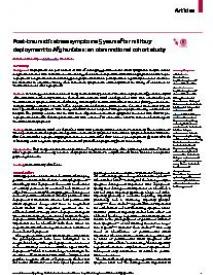Post-traumatic stress symptoms 5 years after military deployment to Afghanistan : an observational cohort study
Background Deployment can put soldiers at risk of developing post-traumatic stress symptoms. Despite several longitudinal studies, little is known about the timing of an increase in post-traumatic stress symptoms relative to pre-deployment. Longitudinal studies starting pre-deployment, in which participants are repeatedly measured over time, are warranted to assess the timing of an increase in symptoms to ultimately assess the timing of an increase in treatment demand after deployment. Methods In this large observational cohort study, Dutch military personnel who were deployed to Afghanistan as part of the International Security Assistance Forces between March, 2005, and September, 2008, were assessed for post-traumatic stress symptoms with the Self-Rating Inventory for Post-traumatic Stress Disorder (SRIP) questionnaire. Participants were assessed 1 month before deployment and followed up at 1 month, 6 months, 12 months, 2 years, and 5 years after deployment, with changes in SRIP scores compared with pre-deployment using a mixed model analysis. The primary outcome was the total score of post-traumatic stress symptoms measured with SRIP at pre-deployment and the five follow-up assessments, with a score of 38 used as the cutoff to indicate substantial post-traumatic stress symptoms. Findings Between March, 2005, and September, 2008, 1007 participants were recruited to this study. The results show two important effects of deployment on post-traumatic stress symptoms. A short-term symptom increase within the first 6 months after deployment (symptom increase coefficient for SRIP score vs pre-deployment [β] 0·99, 95% CI 0·50–1·48); and a long-term symptom increase at 5 years after deployment (β 1·67, 1·14–2·20). Interpretation This study underlines the importance of long-term monitoring of the psychological health of soldiers after deployment because early detection of symptoms is essential to early treatment, which is related to improved psychological health.
Geachte bezoeker,
De informatie die u nu opvraagt, kan door psychotraumanet niet aan u worden getoond. Dit kan verschillende redenen hebben,
waarvan (bescherming van het) auteursrecht de meeste voorkomende is. Wanneer het mogelijk is om u door te verwijzen naar de bron
van deze informatie, dan ziet u hier onder een link naar die plek.
Als er geen link staat, kunt u contact opnemen met de bibliotheek,
die u verder op weg kan helpen.
Met vriendelijke groet,
Het psychotraumanet-team.
In: Lancet, ISSN 0140-6736 | 3 | 1 | januari | 58–64
http://dx.doi.org/10.1016/S2215-0366(15)00368-5


